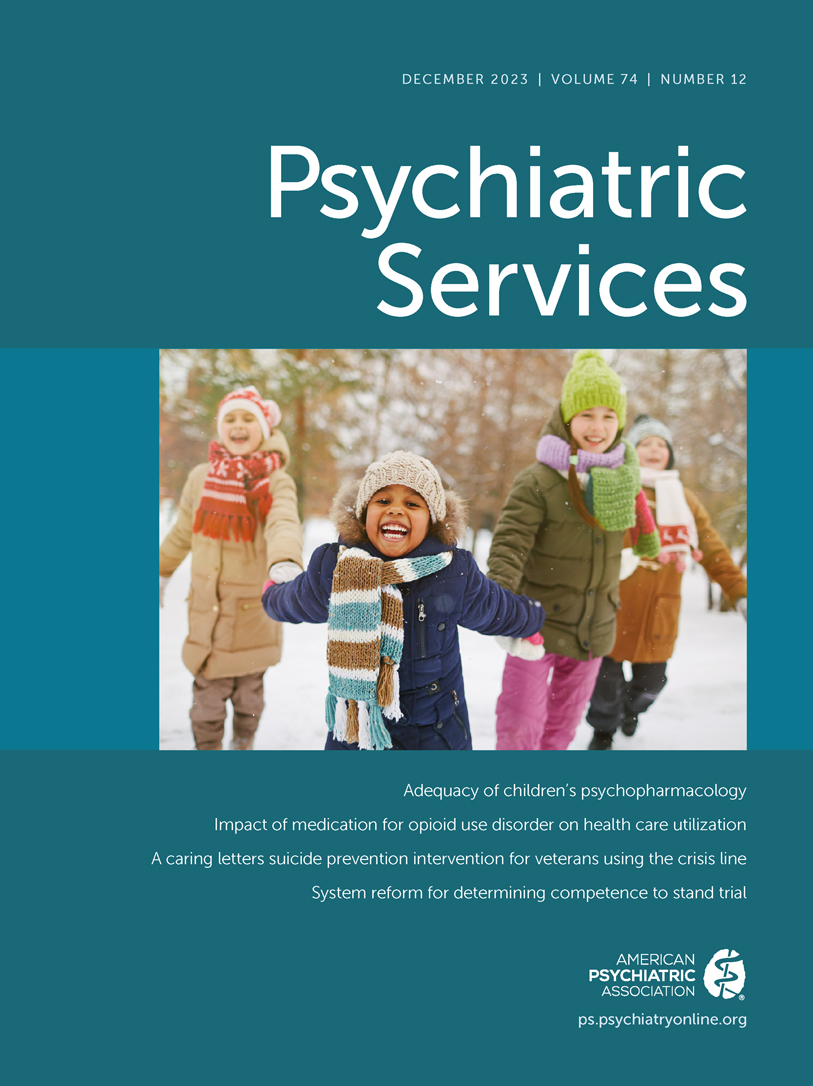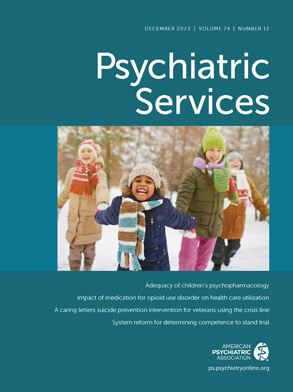At the onset of the COVID-19 pandemic, temporary changes were made to Medicare policies to facilitate continued care and create flexibilities for patients, providers, and health care facilities. Through federal legislation and Centers for Medicare and Medicaid Services (CMS) action, hundreds of temporary policies were implemented that affected health care service delivery to Medicare beneficiaries across the United States, including those in need of behavioral health services (
1,
2). Mental illness and substance use in particular are increasingly prevalent among Medicare beneficiaries, highlighting the need for careful evaluation of any policy changes (
3,
4).
Under the Public Health Service Act, the Secretary of Health and Human Services (HHS) may declare a public health emergency (PHE), which lasts for 90 days and may be renewed. A PHE in response to the COVID-19 pandemic was issued on January 31, 2020, and repeatedly renewed until it ended on May 11, 2023 (
5). When a PHE is declared, the HHS secretary is afforded specific powers, including the authority to temporarily waive or alter Medicare policies as needed to maximize the likelihood that beneficiaries can access care. Because of the massive scale and rapid onset of the COVID-19 pandemic, CMS, under the purview of the HHS secretary, made many changes very quickly (
2).
The changes to Medicare policies could have implications for access to and delivery of mental health and substance use services (
6,
7). As the COVID-19 pandemic has continued, discussions have begun about which temporary policies should be made permanent (
8). Officials also need to determine how temporary policies affected access to and delivery of health care during the pandemic and to prepare for future pandemics and other disasters. Although some policy changes may have improved the quality, affordability, and accessibility of care, other policies may have had unintentional adverse consequences. To date, little attention has been paid to potential unintended consequences of these policies. We sought to examine Medicare policies relevant to care for mental health problems and substance use, hereafter referred to as “behavioral health care,” and to engage with subject matter experts to assess the potential effects of these policies.
Methods
To identify Medicare policies relevant to behavioral health care, we used the Medicare COVID-19 regulation policy tracker developed by Podulka and Blum (
2). Of the 212 policies in the tracker, we identified 36 that were directly or indirectly related to mental health and substance use. To understand and describe each policy change and any associated research evidence, we conducted a detailed review of each policy’s provisions and a literature review that included scholarship, gray literature, and policy documents. The full list of policies we examined is available elsewhere (
9).
Using the information generated by the policy analysis and literature review, we convened a modified Delphi panel with 20 subject matter experts, including experts in Medicare policy, mental health, and substance use (see the online supplement to this report). We identified potential panelists through professional connections, publication review, and references from initial panelist contacts. We contacted each panelist by e-mail to ask for participation. The modified Delphi panel process involved three steps. First, panelists completed a survey in May 2022, indicating how they thought each of the 36 policy changes would affect access to, quality of, and spending on behavioral health care. We then convened the panelists for a 6-hour meeting in June 2022 to summarize each policy and have in-depth, structured discussions that included consideration of potential unintended consequences. Finally, after each policy was discussed, we asked the panelists to rerate the policy in a final survey.
Two study team members (S.A.W. and V.R.G.) took notes during the panel discussion. These notes were reviewed alongside a recording of the discussion to identify key themes regarding unintended consequences of policy changes. The findings were then triangulated with the results of the literature review and survey results to identify policies that might pose a risk for unintentional, negative consequences for Medicare beneficiaries with mental health or substance use conditions. This study was approved by the institutional review board of the Johns Hopkins Bloomberg School of Public Health. The broader findings from this study regarding expert consensus on Medicare policies’ likely effects on behavioral health care access, quality, and spending have been published previously (
9).
Results
Although the modified Delphi panel had 20 members, just 13 (65%) completed the final survey (
Table 1). We identified two policies that might pose a risk for adverse consequences to Medicare beneficiaries in need of behavioral health care: a waiver of hospital discharge planning requirements, which was viewed negatively by our expert panelists, and discretion in HIPAA penalty enforcement, which was viewed as having a mix of both potential benefits and adverse consequences.
Before the pandemic, CMS required hospitals to provide detailed post–acute care discharge planning (
10). At a patient’s discharge, hospitals had to provide the patient with a list of appropriate and available providers and to inform patients or caregivers that they were free to choose any participating Medicare providers. The list was required to identify providers in which the hospital has a financial interest. Most of the discharge planning requirements were waived under the COVID-19 Emergency Declaration Blanket Waivers issued after the PHE was declared (
10). Although hospitals were required to discharge patients to appropriate settings, CMS waived the requirement that hospitals provide a list of provider options, identify financial interests, and inform patients of their freedom to choose other providers. The panelists viewed the discharge planning waiver negatively; they strongly agreed that it was likely to decrease access to behavioral health care (77%), the quality of behavioral health care (100%), and desirable mental health outcomes (100%) (
Table 1). This waiver was tied to the PHE and therefore ended on May 11, 2023 (
10).
Before the pandemic, delivery of services via telehealth was generally limited to services that had been certified as HIPAA compliant (
11). In response to the pandemic, the Office for Civil Rights (OCR) at HHS announced that it would be exercising discretion in enforcement with respect to HIPAA and telehealth care. OCR stated that it would not penalize covered providers if they provided telehealth care in good faith by using technology that is not HIPAA compliant (e.g., Apple FaceTime, Facebook Messenger video chats, and others) (
11). Providers were encouraged, but not required, to disclose to patients that these services may carry privacy risks. Panelists thought that this waiver would increase access to care (85%) and desirable behavioral health outcomes (77%) but were more ambivalent about the effects of the new policy on quality of care and spending (with <60% agreement in these categories). In particular, the panelists had concerns about loss of privacy and the consequences for quality of care. For example, a patient may not fully engage in therapy if their appointment can be overheard by others or if they are concerned about the security of the telehealth technology. OCR has announced that this enforcement discretion will expire alongside the federal PHE, but providers will have a 90-day transition period to bring their operations into compliance with prepandemic HIPAA requirements (
11).
Discussion
The COVID-19 pandemic has intensified needs for behavioral health care, including for older adults. Through a systematic modified Delphi process, a panel of Medicare, mental health, and substance use experts identified potential unintended consequences stemming from changes to Medicare policies in response to the COVID-19 pandemic. They particularly noted potential negative effects of the hospital discharge planning waiver. The waiver does not explicitly mention care for mental health problems or substance use, but Medicare beneficiaries with these needs may face an elevated risk for harm resulting from this waiver. Discharge planning is intended to ensure that a patient is aware of all appropriate post–acute care providers and can make an informed decision. This step may play a role in preventing readmission, particularly for those with mental illness or substance use disorders (
12–
14). Waiving these discharge plan requirements may make it more likely that discharged patients are unaware of their treatment options and may end up in post–acute care that, although clinically appropriate, may not be ideal. This could lead to readmission or other adverse health outcomes.
Unlike for the discharge planning waiver, the expert panelists viewed the temporary reduction in HIPAA enforcement as having positive impacts on care access. However, the panelists also expressed reservations regarding potential adverse consequences of this suspended policy on privacy and quality of care among individuals with mental illness or substance use disorders. The flexibility afforded by the discretion in HIPAA enforcement has helped ensure that patients continue to receive care, but research into pandemic-era telehealth use has found that older adults have expressed concerns over patient confidentiality (
15). Medicare beneficiaries with needs arising from mental health problems or substance use may be particularly susceptible to privacy risks and effects of telehealth delivery on care quality, especially if a technology or service is new to them. As patients and providers grow more adept at using telehealth technologies, it may not be necessary to adopt a similar policy of greater discretion in HIPAA enforcement for future pandemics or disasters. For future telehealth and HIPAA guidelines, however, it will be critical to consider disparities in access and technology capacity among Medicare beneficiaries in need of behavioral health care.
Our findings point to important preparedness lessons for CMS officials. Even though there is consensus that many policies adopted by CMS in March 2020 hold promise for improving behavioral health care access, quality, and outcomes—particularly policies expanding access to and coverage of telehealth services and policies creating staffing flexibilities for hospitals (
9)—Medicare disaster response policies may also have unintended consequences for people with mental or substance use disorders. For future pandemics or other disasters, decision makers must assess, before an emergency, which policies should be waived in specific scenarios and weigh the risks and benefits of those policy changes for specific populations, including those in need of care for mental health problems or substance use. Future research should quantitatively evaluate clinical and patient-reported outcomes of pandemic policies to determine whether these policies did have adverse effects.
This study had a few limitations. First, although unintentional adverse consequences were a part of our panel discussion, our survey did not ask panelists to explicitly describe any hypothesized or observed adverse consequences. Future research should use data sources such as claims data and survey data to determine whether care outcomes were affected by these policies. In addition, the policies we identified here do not represent an exhaustive list of administrative policy changes that might unintentionally affect people with behavioral health needs. The policies we identified came from a sample of Medicare policies; other policies affecting non-Medicare populations were not included. The panel also did not discuss severity of mental illness or substance use disorders or demographic variables. Future work should seek to disaggregate experiences by those with different diagnoses and symptoms.
Conclusions
Many Medicare policy changes were necessary to treat those hospitalized with COVID-19, limit the spread of the disease, and maintain health care delivery. Officials had to react quickly to create flexibilities for providers, facilities, and patients, which means that the full suite of potential adverse consequences, including for those with mental illness and substance use disorders, may not have been completely considered. Future pandemic and emergency preparedness efforts and responses should consider burdens on an array of populations, including Medicare beneficiaries with mental illness or substance use disorder.

